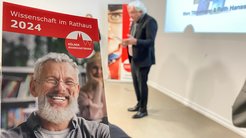Does our brain make us obese?
Max Planck scientists present their research at Cologne City Hall
Every first Monday of the month, members of the "Kölner Wissenschaftsrunde" (Cologne Science Roundtable) present exciting current research to the citizens of Cologne at "Wissenschaft im Rathaus". This time, Max Planck scientist Prof Dr Marc Tittgemeyer and physician Dr Ruth Hanßen from Cologne University Hospital spoke about the brain and metabolism.
In his welcoming address, Mayor Dr Ralph Elster praised the outstanding research being carried out at the four Max Planck Institutes in Cologne and emphasised the importance of research for the city of Cologne.
"We live in an obesity pandemic".

Speakers Marc Tittgemeyer and Ruth Hanßen began by pointing out the growing number of obese people in Germany and around the world, and explained the consequences of obesity. They used recent research to show how closely metabolism and behaviour are linked. For example, they reported on one of their recent studies in which the consumption of two high-sugar and high-fat puddings a day over a period of eight weeks led to the subjects developing a preference for high-fat and high-sugar foods.
Impressed by the research presented, the large audience asked about the application of the research to everyday life: Do I need to change my canteen at work to encourage healthy eating? Do I even have free will if my brain is so powerful in determining my behaviour?
At the end of the evening, it was important for the speakers to emphasise that being overweight has nothing to do with indiscipline. "If someone weighs 180 kilos, it's not by choice. Once you're in this vicious circle, you can't break out of it by sheer force of will. This knowledge is still far from reaching the general public," says Dr Hanßen.
















